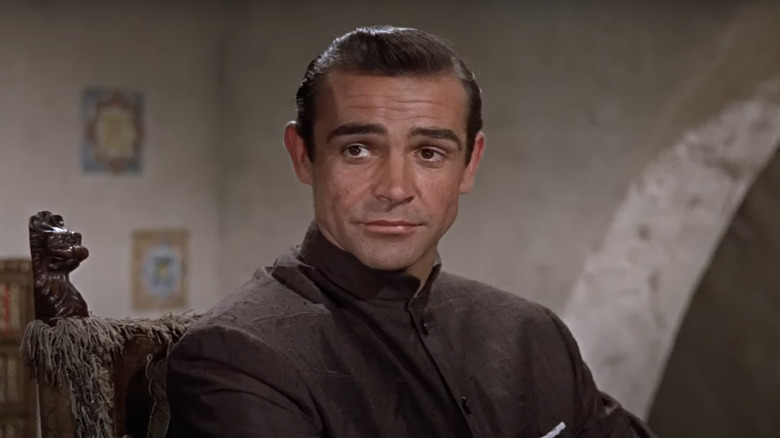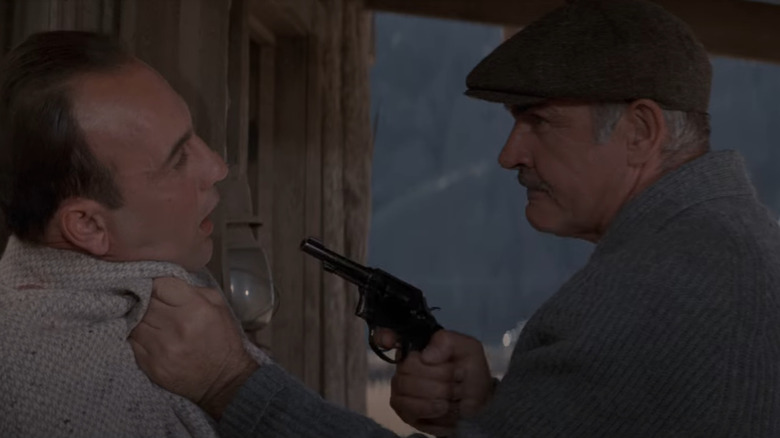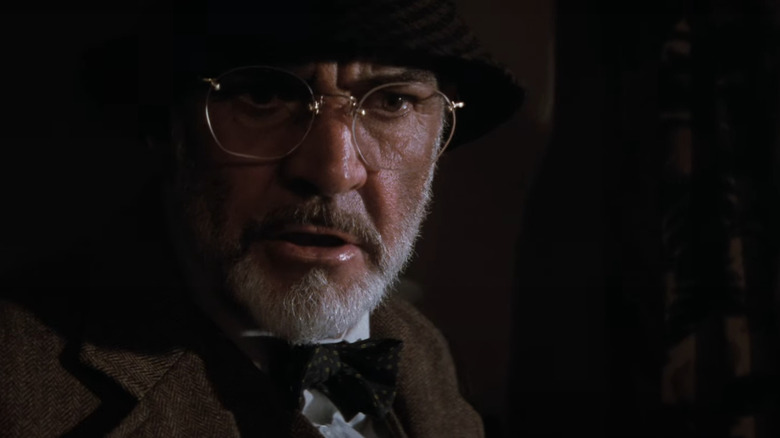Sean Connery Took The Long Road To The World Of Acting
It's a tale as old as time — or at least as old as Hollywood. An actor gets cast in a role that comes to define, even haunt, them as they traverse the perilous landscape of the movie business. They scavenge for roles that due to their unfortunate type-casting continue to elude them until they just give up and become like a vet or get a Masters in Business Admin or something.
Happily, being type-cast doesn't always end careers. Robert Pattinson, for example, after gaining worldwide notoriety as the sparkly vampire, has been on a mission to prove his worth as a diverse talent in recent years, playing against type and impressing everyone in the process. But before him, a little actor by the name of Sean Connery walked so that Pattinson could run.
Believe it or not, Connery had quite an illustrious and prolific career beyond being Bond and Indiana Jones' dad. But it took a while for the late star to establish himself as a serious character actor and become more than your average leading man. Luckily, the celebrated Scot was used to hardship and perseverance, having taken what you might call a "long road" to acting in the first place.
From milkman to leading man
It's well known that Connery was a proud Scot, championing his native land throughout his career and even donating his record-breaking "Diamonds Are Forever" salary to his own Scottish International Educational Trust. He was born Thomas Sean Connery in the country's capital, Edinburgh in 1930 and grew up in the area known as Fountainbridge. He fondly recalls playing soccer with his friends "in the meadows" and that acting wasn't really on his mind as a child.
The young Scot always had a strong work ethic. He was employed, as The Hollywood Reporter notes, as a milkman and a butcher's assistant as early as the age of nine, dropping out of school at 13. He then had a short-lived career in the Royal Navy, making him the only 007 actor to have actually served in the naval force. At that time, acting was still nowhere on Connery's radar and after being medically discharged from the Navy, he considered becoming a soccer player and fulfilling his childhood ambitions. At 23 he was even offered a contract to play for Manchester United.
But Connery instead began working as a dresser at a local theater. As he remembers it, while on the job during a production of Roger and Hammerstein's "South Pacific:" "an American actor in the cast, Robert Henderson said 'would you want to be an actor' and I seriously had never considered becoming an actor." Intrigued by Henderson's suggestion that acting would provide a career well into Connery's later years, he "went to work with it" and began reading everything from Shakespeare to Proust in order to refine his rough Scottish manner and become able to "look as though [he] could work in a mine and have read Proust."
Bond and beyond
Once Connery had gotten a taste for acting and dropped his first name, his career would take off and become one of the most consistent and impressive acting runs of all time — though, it wasn't without its challenges. His role as James Bond in 1963's "Dr. No" would prove to be the magic ticket that launched Connery, but it also brought with it a host of problems for the fledgling actor. As he put it, the "scale of reverence and pressure" was too much for him to handle alone and the inexperienced Conner admitted to making mistakes in the early days of his new-found fame. In fact, frustrated by the inevitable type-casting that came with the role, he even began to seemingly resent the character of 007 and, as Vanity Fair reports, referred to Bond as a "dull, prosaic English policeman."
Thankfully, Connery escaped the shadow of his first major role in the following years, though it took some time. By the '70s he'd managed to establish himself as a capable character actor, beyond his abilities as a leading man. And once his bearded on-screen dad age hit in the '80s, the star of everything from "The Untouchables" to "Indiana Jones and the Last Crusade" had truly transitioned to serious, dramatic actor. No doubt helped by that work ethic he'd developed in his hometown of Edinburgh, by the time Connery passed away in 2020 he'd managed to do exactly what Robert Henderson had said by maintaining an acting career well into his senior years. All of which proves that a strong work ethic can not only lead you to the career you deserve, but can keep you there for a long time.


